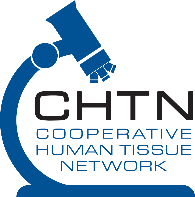
Shannon J. McCall, MD, associate professor of Pathology, director of the Duke BioRepository & Precision Pathology Center (BRPC) and co-leader of the Duke Cancer Institute’s Precision Cancer Medicine & Investigational Therapeutics (PCMIT) research program has received a UM1 grant of $3.6 million from the National Cancer Institute (NCI). UM1 grants typically fund projects involving multiple institutions and aim to accelerate the translation of scientific discoveries into practical applications by funding research infrastructure, personnel, equipment, and resources.
The award will support the BRPC during its second five-year term from 2024-2029 as a member of the NCI’s Cooperative Human Tissue Network (CHTN). NCI established the CHTN in 1987 in order to increase access by academic and private investigators to human biospecimens, data, and associated sample processing services tailored to their specific scientific protocols, thereby increasing the pace of cancer research. It’s a unique resource for investigators to obtain tissues and fluids from routine surgical and autopsy procedures to use in their studies.

The CHTN consists of one national pediatric biorepository and five divisional academic pathologist-led biorepositories in the United States. Since its inception, the CHTN has supported thousands of investigators by distributing almost 1.5 million samples. CHTN principal investigators (PIs) are expected to be active in the biomedical research community and contribute to research, biospecimen science, and policy on an international level.
Divisions of the CHTN for 2024-2029 with their pathologist PIs will be:
- Vanderbilt University Medical Center (CHTN Western Division): Mary Kay Washington, MD, PhD
- University of Pennsylvania (CHTN Eastern Division): Kathleen Montone, MD
- University of Virginia (CHTN Mid-Atlantic Division): Christopher Moskaluk, MD, PhD
- Duke University (CHTN Southern Division): Shannon J. McCall, MD
- Ohio State University (CHTN Midwestern Division): Anil Parwani, MD, PhD
- Nationwide Children’s Hospital (CHTN Pediatric Division): Nilsa Ramirez, MD
McCall is a practicing gastrointestinal (GI) pathologist at Duke and is board-certified in Clinical Informatics. In addition to directing the BRPC at Duke, she is Duke Site PI and Steering Committee member for the American Association of Cancer Research’s (AACR) Genomics Evidence Neoplasia Information Exchange (GENIE) project, which is among the largest publicly available genomic datasets released to date. She’s an advisor to the International Society of Biological and Environmental Repositories (ISBER) Standards Committee and is the chair of the Biorepository Accreditation Program Committee of the College of American Pathologists (CAP). She studies upper GI tract carcinogenesis and previously served as a member of the data analysis working group for The Cancer Genome Atlas (TCGA) esophageal and pan-GI projects.
Duke faculty co-Investigators on the UM1 award include Katherine Garman, MD, (Gastroenterology) and Duke Pathology faculty members Michael Datto, MD, PhD, Jadee Neff, MD, PhD, Rami Al-Rohil, MBBS, Wei Chen, MD, Rachel Factor, MD, and Fengming Chen, MD. The CHTN management team at Duke includes BRPC Research Program Leader/CHTN Coordinator Katherine “Kate” Frankey and CHTN Collections Team Lead Elizabeth Howington.
The BRPC was created in 2012 with investment from Duke Cancer Institute and Duke University School of Medicine. It has been accredited by CAP as a biorepository since 2013. A broad research biobanking protocol covers the BRPC’s procurement activities, allowing excess tissue, biopsy tissue, and research blood/fluid donation. As of this publication, over 8,200 Duke patients have chosen to participate in the BRPC. The biorepository also contains millions of archival patient tissue samples and leftover clinical blood/fluid samples that can be accessed for research under Duke Institutional Review Board oversight.
The Duke BRPC faculty leadership team includes associate directors William Jeck, MD, PhD, (for AI and Computational Pathology), Jadee Neff, MD, PhD, (for Genomics and Spatial Profiling), and Sergio Pina-Oviedo, MD (for Immunohistochemistry). Learn more about the Duke BRPC. Read about notable projects related to the BRPC and Project GENIE in “Partners to the Core.” Explore Duke BRPC Milestones.
In celebration of CTHN’s 35th anniversary in 2023, McCall co-authored an article in Molecular Cancer Therapeutics. In it, she covering the network’s history and broke down the advances of the past 15 years, which included the start from molecular biomarker testing of individual genes, to panels of hundreds of genes, to the increased use of whole-exome and whole-genome sequencing. Read more about its history. Learn more about the Cooperative Human Tissue Network.